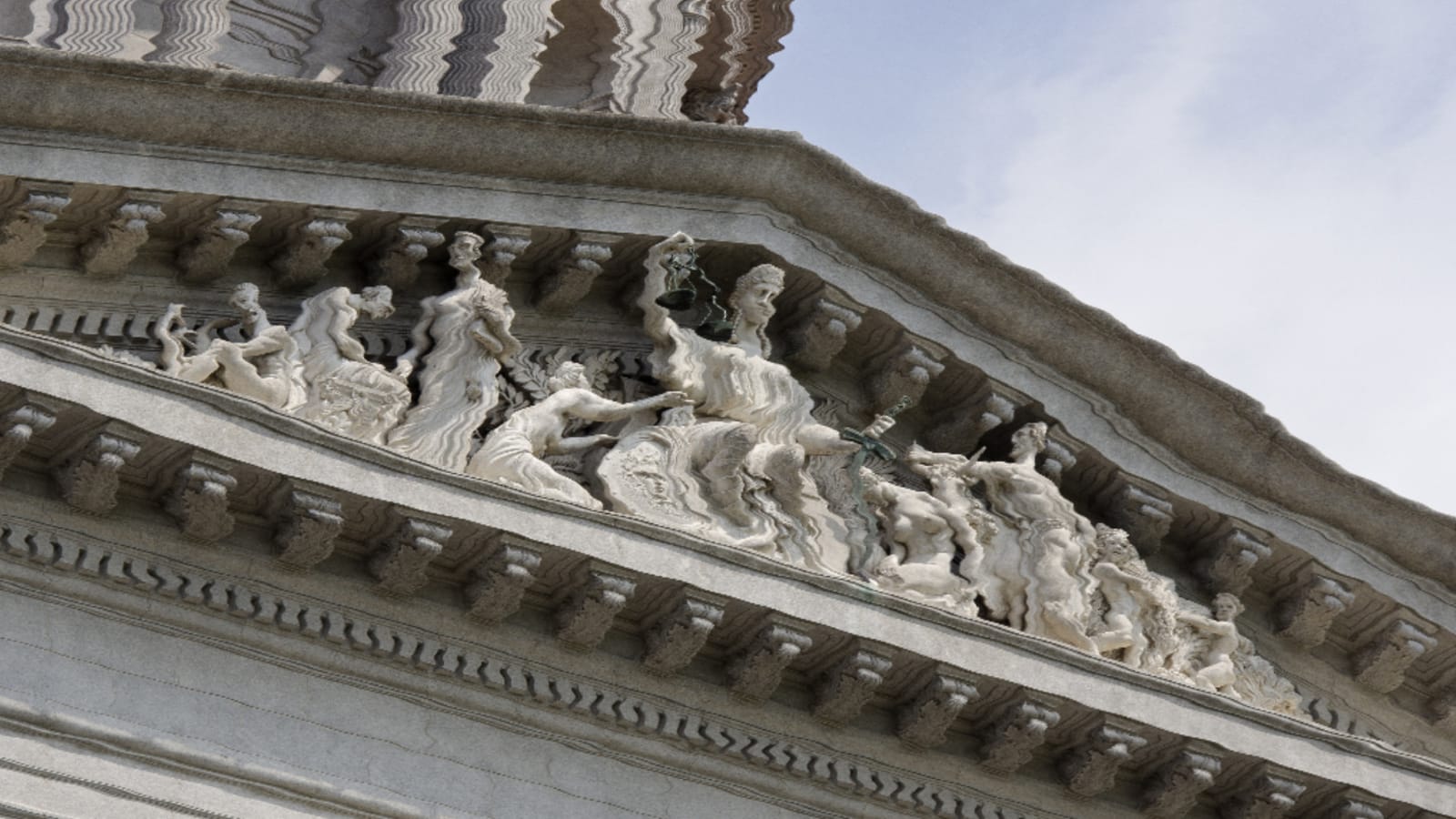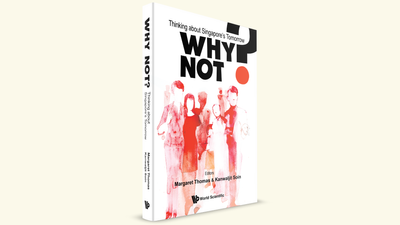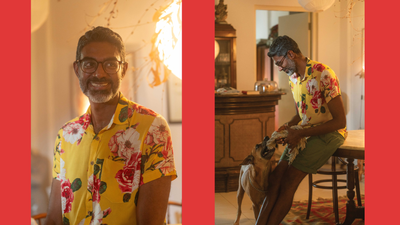In which situations does the Singapore government typically issue directives under The Protection from Online Falsehoods and Manipulation Act (POFMA), colloquially known as “Singapore’s fake news law”? Prior to July 16th 2023, I had believed, based on my analysis of some orders—including to Hardware Zone and TOC—that when media outfits get “POFMA-ed”, there’s probably some clear, legitimate reason for it.
By contrast, only political parties, like the Singapore Democratic Party (SDP), are subject to seemingly curious POFMA orders, I thought—as evidenced by the High Court’s decision to partially overturn a POFMA order given to the SDP. Whatever my reservations about the law itself, in other words, it’d be used in a reasonable way with media outfits like ours.
Alas, that was my conceit, born of naïveté. Having lost our “POFMA virginity”, and being privy to the mechanics of the whole process, including what I see as the radically skewed interpretations of our words by ministers, I now have a deeper appreciation for the dangers of this law.
The POFMA office issued directives to Jom for three alleged falsehoods in “Singapore This Week”, published on July 7th 2023. Jom first failed in our appeal to the ministers themselves in July, and then again at the High Court in September, and then, on November 2nd, at the Court of Appeal, which dismissed our “leave to appeal”, bringing an end to this journey. I can now share candid thoughts on the three so-called “subject statements” for which we received POFMA orders.
I partially agree with one of them but resolutely disagree with two. We, and I in particular, could have done a better job with our description of what Teo Chee Hean, senior minister, said in relation to conflicts of interest with the Ridout Road saga. For the other two statements, concerning alleged corruption with said saga, and with the government’s alleged interference with Instagram, I consider the POFMA orders utterly nonsensical.
While cherishing the independence of the work of Valerie Thean, High Court judge, and accepting her decision, we respectfully disagree with it. We do not consider the POFMA office’s interpretation of Jom’s words in those instances to be a reasonable one. Before discussing the concepts of truth and falsehoods in society, and the potentially harmful effects of POFMA on journalism here, I’d like to first engage in some close reading of our words, and the government’s objections to them.
1. What Teo Chee Hean, senior minister, said about conflicts of interest in the Ridout Road saga
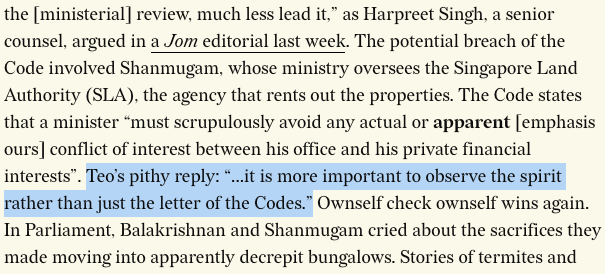
Teo Chee Hean’s Parliamentary statement on July 3rd 2023, almost 6,000 words in total, included over 1,000 words in response to concerns around conflicts of interest (COI). Jom had roughly 400 words, the limit for our blurbs in “Singapore This Week”, to summarise the entire proceedings, including the issue of COI. We had to exercise editorial judgement. In our view, we mentioned the salient point (“...spirit rather than just the letter..”).
In its POFMA directive, the government summarised Jom’s position in this subject statement:
“Senior Minister Teo Chee Hean did not respond to questions concerning the issue of actual or apparent conflicts of interest and possible breach of the Code of Conduct for Ministers beyond replying that it is more important to observe the spirit rather than just the letter of the Code.”
Is that what Jom said? I would argue that we never said that Teo “did not respond to questions….beyond replying that it is more important to observe the spirit rather than just the letter of the Code.” We didn’t even mention the questions he received, but simply focused on the salient point. Readers, in our view, would note the ellipsis at the start of the quote, and surely realise there is more.
And yet, I can also sympathise with the government’s position. Our omissions of Teo’s other comments on COI might potentially lead some readers to conclude that he said nothing else of particular merit on the issue. How could we have improved our statement, while still being succinct? One possibility:
“Teo argued that all parties involved conducted themselves properly, and ‘took appropriate steps to prevent any potential or actual conflict of interest from arising.’ In a lengthy statement, he also added: ‘...it is more important to observe the spirit rather than just the letter of the Codes.’ Ownself check ownself wins again.”
Or, a much shorter option:
“Teo’s lengthy reply included this: ‘...it is more important to observe the spirit rather than just the letter of the Codes.’ Ownself check ownself wins again.”
In this formulation, the “lengthy” rather than “pithy” reply would have offered the reader even more guidance about the substance of Teo’s comments on COI. (Not to imply that the edit would have saved us from a POFMA; we’ll never know.)
It is for this reason that I partially agree with the government’s criticism of Jom’s journalism, and take responsibility for it. We should have done better. That said, I’m unconvinced that a POFMA order was necessary. This could have been easily resolved with a “Letter to the editor”, which we’d publish, or a simple request for an amendment, as the Attorney-General’s Chamber has done with us in the past.
In a world of genuine, malicious falsehoods—say, election interference or vaccine disinformation—the use of POFMA for situations like this dilutes the potency of the law, something I’ll return to.
2. Whether the Singapore Land Authority (SLA) showed preferential treatment to the Ridout Road lessees because they were ministers
I’d like to preface this point by highlighting that twice at the start of this blurb, in the title and in the first sentence, Jom clearly stated that there is “no corruption” in the Ridout Road saga. The entire framing of our piece exonerated all of any wrong-doing. Below is the passage in question.
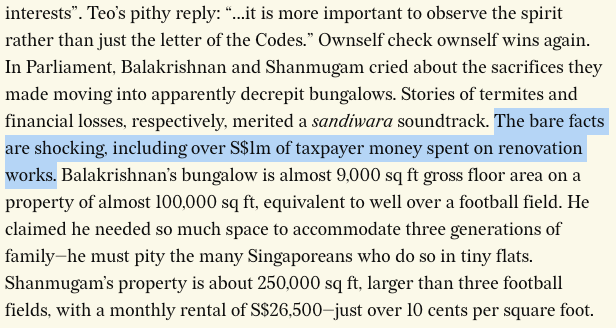
In its POFMA directive, the government summarised Jom’s position in another subject statement:
“SLA spent more than $1 million on the renovation for 26 Ridout Road and 31 Ridout Road because the Ministers were to be the tenants.”
In our appeal, we argued that this is all we meant by the “bare facts are shocking”: the amount spent on the renovation is very large; the size of the properties is very large; and the square foot rent for 26 Ridout Road is very low. The identity of the tenants, in our view, was irrelevant to the facts being shocking.
In rejecting our appeal, Thean said, among other things: “The flow of the text within the article and its conclusion is an assertion that conflicts of interest caused SLA to spend more than $1m in taxpayer money to renovate the large properties despite the low rental return.”
We respectfully disagree. We never intended to say that, we don’t believe we actually said that, and we also disagree that Jom’s readership will interpret it that way.
3. Whether the Singapore government caused Instagram to geo-block a post by Charles Yeo
This blurb looked at the apparent geo-blocking (only in Singapore) of an Instagram post by Charles Yeo, a former opposition politician with the Reform Party, in which he alludes to crony capitalism in Singapore involving K Shanmugam and his son.
Below is the passage in question.
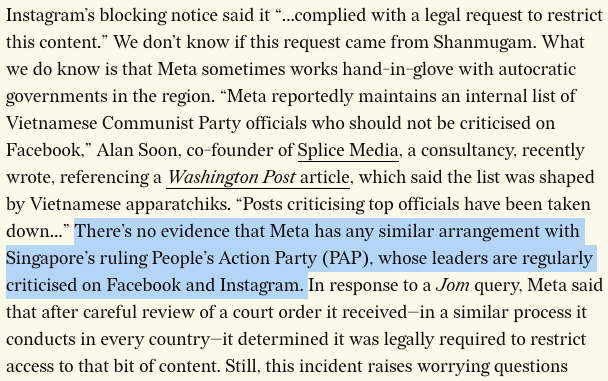
In its POFMA directive, the government summarised Jom’s position in this subject statement:
“The Government caused Instagram to geo-block a post by Charles Yeo.”
It’s unclear how one could conclude that Jom made the above assertion. It is the duty of journalists to interrogate fairly based on the available information. In fact, I would contend that Jom went out of our way to make clear that, unlike in Vietnam, there’s “no evidence” that the government is telling Meta what to do.
In rejecting our appeal, Thean said, among other things:
“With the line, ‘[w]e don’t know if this request came from Shanmugam’, the article is implying it was indeed Minister Shanmugam, a member of the Government, who caused Instagram to geo-block Charles Yeo’s post.”
and
“In my view, what the article does, by a series of speculative associations, is set out a case that the Government caused Instagram to geo-block Charles Yeo’s post. Again, while this is not spelt out literally, the whole import of the article leads to an assertion that the Singapore Government asked Instagram to geo-block the Charles Yeo post in Singapore.”
We respectfully disagree with both of her arguments. To the first point, let me share my journalistic perspective. The offending post by Charles Yeo is about Shanmugam and his son. Meta told Jom that it received a court order, which it had to comply with, and thus it geo-blocked Yeo’s post.
If I had written the blurb given those facts, and I did not say anything about the order’s origins, some readers might have assumed it came from Shanmugam. So to preclude that, we deliberately included the line: ‘[w]e don’t know if this request came from Shanmugam’. Interestingly, Thean has read it the opposite way of what we intended. She claims that with that particular line, the article implies that it was indeed Shanmugam.
Saying “we don’t know” means “we do know”? This is a puzzling and regrettable reading of our words.
“Democracy insists on the idea that truth both matters and that nobody gets to say definitively what it is. That’s a tension that’s built into democracy from the beginning, and it’s not solvable but is, in fact, intrinsic to democracy. I think both things matter. We don’t want to have one definitive source of truth.” - Sophia Rosenfeld, historian and author of Democracy and Truth: A Short History.
Some believe we are living in a post-truth era. Yes, “fake news” has been around for centuries. And contestations over truth have long stymied human progress—Galileo, Darwin, and many others throughout history were first derided as charlatans by some in power before their ideas started to seep into the mainstream.
Yet, the pursuit of truth always mattered. The contestations were necessary to help us achieve a shared objective. The worry about a post-truth era is novel, as Rosenfeld contends, in that many now appear to simply be indifferent to the truth.
It’s a situation born of a confluence of forces, including digital technologies which, because of their unprecedented speed and reach, and their dependence on algorithms that prize what’s popular over what’s verifiable, have blurred the lines between sources of authority, and between legitimate and illegitimate stories.
Many people have been numbed by the blizzard of information, and thus discouraged from making sense of it. The exploitation of this confusion by demagogues like Trump has coincided with a rejection of expert authority, itself partly the result of the yawning inequalities that have emerged in democracies that have failed to deliver equitable growth.
It’s unsurprising that politicians everywhere, including in Singapore, are increasingly worried about society’s inability to communicate off a shared base of facts. Democratic public life depends on it. But the only prescriptive that is sustainable is a democratic one—the need to improve literacy, critical thinking, and fact-checking skills among the population, while bolstering institutions, including universities and media outlets, and civic and political processes, which will collectively support the pursuit of truth.
Instead, Singapore, with POFMA, has opted for an elitist, hierarchical approach, with politicians becoming the arbiters of truth. Worryingly, the use of POFMA has been extended by them beyond literal facts, as Jom’s experience shows, to presumed interpretations of underlying assertions.
I’ll use three different Singaporean examples to show why, as Rosenfeld argued, it’s bad to have “one definitive source of truth”. First, consider the infamous 2016 survey by the Institute for Policy Studies (IPS) on racial preferences for prime minister and president, which were depicted in mainstream media articles as such.
Their main thrust was that “the vast majority of the 2,000 respondents prefer the country’s top leaders to be of the same race as themselves”.
But so what? Run the same survey in any other country, and you’ll probably get the same preference. The much more important finding was this: the vast majority of Singaporeans will accept a prime minister and president of any race. Instead of emphasising this, why, then, did the survey findings focus on the unsurprising racial preferences?
Well, it was run by IPS in the lead up to the 2017 presidential election that was ultimately reserved for Malays. Perhaps there was a need, conscious or not, to focus on Singaporeans’ supposed communalism, in order to justify the reserved presidency. At the very least this survey was convenient for the subsequent constitutional amendments.
What, then, is the “truth” to emerge from this survey? And who should be the gatekeepers of it? If Jom disagreed with IPS and the mainstream media, and highlighted a different key finding, would we be liable for a POFMA?
A second example shows how something like a statistic can also be a site of contestation for truth. Consider the Gini coefficient, a measure of inequality. The higher the number, the more unequal the society.
But Singapore’s measure includes only income from work, whereas many other countries also include income from investments and other sources. By omitting income from investments, including rent, Singapore is almost certainly underestimating the incomes of rich people, many of whom, for instance those in private equity, earn more from their investments than they do from their salaries.
Non-working households, as Ng Kok Hoe of the Lee Kuan Yew School of Public Policy argued in 2018, are also left out of the measure. By doing so, Singapore is also probably overestimating the incomes of those at the bottom. So, in calculating our Gini coefficient, we leave out some at the top, and we leave out some at the bottom—and we therefore, in all likelihood, appear to have a more equitable distribution of income than we actually do.
To compare Singapore’s Gini coefficient to that of other countries is an apples to orange comparison. Yet politicians continue to do so, most recently Lawrence Wong, deputy prime minister, at the Economic Society of Singapore annual dinner, using the above chart.
To be fair to Wong, a footnote on the chart mentions the discrepancy in methodology; and analytically, it’s always tricky comparing Singapore, a city-state, to continental countries. Rich global financial hubs, like London and New York, tend to have higher levels of inequality than the respective countries they’re in.
Nevertheless, Singapore persists with this comparison, in a way that probably obscures the reality of inequality here. One wonders how many lay readers will grasp the different methodologies at play. Sceptics might see it at best as a bit of political spin, and at worst as a form of subterfuge.
So, what is the “truth” about Singapore’s Gini coefficient? Should Wong and his colleagues be the gatekeepers of it? If Jom criticised the government’s measure and suggested another Gini coefficient as closer to “the truth”, would we be liable for a POFMA?
Many Singaporeans put unquestioned faith in the work of SingStat, but the reality is that data and statistics are prime sites for the contestation of truth. Look closely at what’s measured, how it’s measured, and also, importantly, what’s not measured, such as the ethnic breakdown of our prison population. Alarmingly, not even a Parliamentary question in 2007 by Sylvia Lim of the Workers’ Party could get the government to divulge this. The PAP’s reticence means that many on the left now just assume that an overwhelming majority of prisoners are Indian and Malay men, and that the fact needs to be hidden because injustices have occured–assumptions that may not be helpful to societal discourse and cohesion.
The third and final example perhaps most simply shows the problem with a single “truth”. In 1987, the government arrested and detained without trial 22 church workers, opposition volunteers, and activists, claiming they were “Marxist conspirators” plotting to overthrow the state.
Was the Internal Security Act (ISA) used on actual Marxists plotting a Marxist conspiracy? The official government line remains yes. But in recent years, many people, including Chew Kheng Chuan in a Jom profile, and Tharman Shanmugaratnam, first in 2001 and recently on the presidential election trail, have cast doubt on this.
By doing so, haven’t they eroded confidence in the ISA? Why haven’t Chew, Tharman, and Jom been POFMA-ed for this? What is the “truth”?
Of the three examples, this is the most easily discernible statement that might warrant a fact check. Either they were or they weren’t Marxist conspirators. There would appear to be a clear falsehood propagated either by the government or its detractors.
By contrast, the Gini coefficient dispute could be viewed simply as a difference in opinion about methodology; while the racial preference dispute could be seen as differing interpretations of the same survey results.
Yet, the point here is that the government’s liberal use of POFMA over the years has blurred this distinction between actual facts, opinions, and interpretations. A few weeks after Jom received its POFMA directives, a young journalist from another outlet, aghast at what constituted falsehoods in our work, asked me: “Are we supposed to simply repeat public statements and press releases wholesale?”
Mainstream media journalists have long been lampooned by the literary crowd for doing exactly that, to the detriment of their writing. But the counter-argument is that they are acting quite rationally, given the censorial nature of our politicians, and the narrow space for journalistic flair. Just regurgitate what the minister says, please. No wonder so many bureaucrats—graduates of the PAP school of journalism—end up joining The Straits Times; and why so many literary writers end up leaving it.
In “RSF’s Press Freedom Index: why does Singapore rank so low?”, Jom examined the numerous threats to the media here, from preferential access for friendly media channels to the psycho-emotional risk for journalists, including the public discrediting of their work by authorities. When listening to such criticisms of Singapore’s media model by those of us clamouring for greater freedoms, PAP apologists often assume that we seek to emulate the media environments in the US, the UK, or some other liberal democracy.
Not true. We’re all painfully aware of their flaws. In the US, for example, media polarisation and the proliferation of falsehoods have led to pitiful informational outcomes. Consider that over half of Republicans surveyed in June 2022 believed (falsely) that left-wing protesters had led the riots at the US Capitol on January 6th 2021 in order to make Trump look bad.
The presumption of Anglophilia on the part of Singaporean progressives may allow conservatives here to score some cheap, nationalistic brownie points, but is unhelpful. Indeed, as with other aspects of our civic and democratic rights, when it comes to the media, I believe that Singapore is uniquely positioned to develop a vibrant and responsible sector, one that will foster democratic discourse and the literary arts to the benefit of our entire society. Indeed, it’s for that very reason that we started Jom.
It’s with all that in mind that we offer our critique of POFMA. To be clear, online falsehoods are a scourge of society. We must tackle them. Yet by making ministers, who are prone to partisan politics, the arbiters of truth, Singapore’s approach was always liable to mission creep.
Recall what Shanmugam had said in Parliament about POFMA, in response to suggestions that existing legislation was sufficient: “The Bill on the other hand was fashioned to deal specifically with falsehoods that can be spread online with incredible speed, in a targeted manner [emphasis mine], and to address such falsehoods, with speed, with proportionality, and with the Courts given greater powers.”
And then consider its use on “Singapore This Week” at Jom. That article with the three alleged falsehoods garnered 2,250 views in the seven days after it was published, on July 7th 2023. There was no virality. The POFMA office didn’t even seem to exhibit any urgency—it issued its orders only on July 16th, nine days later. Even if we accept the POFMA office’s interpretations of Jom’s work, exactly how were these alleged falsehoods ripping through our societal fabric?
What I consider to be the indiscriminate use of POFMA, including on Jom, has effectively diluted the potency of the law. Many Singaporeans now laugh it off as a blunt tool used to further political agendas. When Jom got POFMA-ed in July, I received an overwhelming number of messages telling me “You’ve made it!” and “Welcome to the Club!” POFMA’s ability to tackle deliberate, malicious falsehoods has been compromised. Whenever the POFMA office issues orders, a growing proportion of Singaporeans wonder if it’s less about “truth” than politics.
This jeopardises all of us, especially outfits like Jom. An online environment filled with falsehoods is undesirable; we need honesty and transparency in order to perform our work and compete fairly. I am especially concerned about the lead-up to the next election, given everything from deliberate interference by rogue governments to the growing use of AI in political campaigns.
It’s worth noting that the courts, as a form of recourse, are also limited. Judges have to discern between statements that may have “multiple meanings”, and have to assess what an “ordinary reasonable reader” will interpret. Put another way, Thean had the unenviable task of having to decide whether an ordinary Jom reader might see things the way the POFMA office did.
Finally, there is a disjoint between the demands of an authority that believes everything must be spelt out in painfully excessive language—and the realities of journalism, where we often work under the constraints of word counts.
For each blurb in “Singapore This Week”, as mentioned, we have a rough word limit of 400. Surely when we try to synthesise stories, we have to curate, and we have to succinctly share our opinionated view of a situation. There is subjectivity involved. We all have our biases. There is no way my idea and structure of the story will match exactly, say, that of the ST editor, or the POFMA office.
If POFMA continues to be used in this way, the inevitable outcome is that Singapore’s journalism will tend towards a bland, stultifying, homogeneous form, in which only one way of reporting and commenting on issues is acceptable. This may please prickly politicians eager to peddle their singular worldview in service of an agenda. But it will dull the minds of every other Singaporean.
That’s a shame.
Sudhir Vadaketh is Jom's editor-in-chief.
If you enjoy Jom’s work, do get a paid subscription today to support independent journalism in Singapore.
Letters in response to this piece can be sent to sudhir@jom.media. All will be considered for publication on our “Letters to the editor” page.

